Trans-Theoretical Model of Change in Weight Management Case Study
VerifiedAdded on 2022/11/01
|10
|3053
|4
Essay
AI Summary
This essay presents a case study of a 58-year-old male chef, Harry, who is obese and scheduled for a hip replacement. The assignment applies the Trans-Theoretical Model of Change (TTM), outlining the stages of pre-contemplation, contemplation, preparation, action, and maintenance to address Harry's weight management. It emphasizes the importance of motivational interviewing techniques in helping Harry adopt healthier behaviors, recognizing his love for food and potential resistance to change. The essay details how motivational interviews can be structured to address Harry's concerns, promote healthy eating habits, and encourage adherence to a weight loss plan, including the use of SMART goals. The paper also highlights the benefits of weight reduction before and after surgery, including reduced surgical complications, improved mobility, and decreased risk of co-morbidities such as osteoarthritis. The conclusion reinforces the value of a personalized approach, integrating the TTM and motivational interviewing to support long-term lifestyle changes and improved outcomes for patients like Harry.
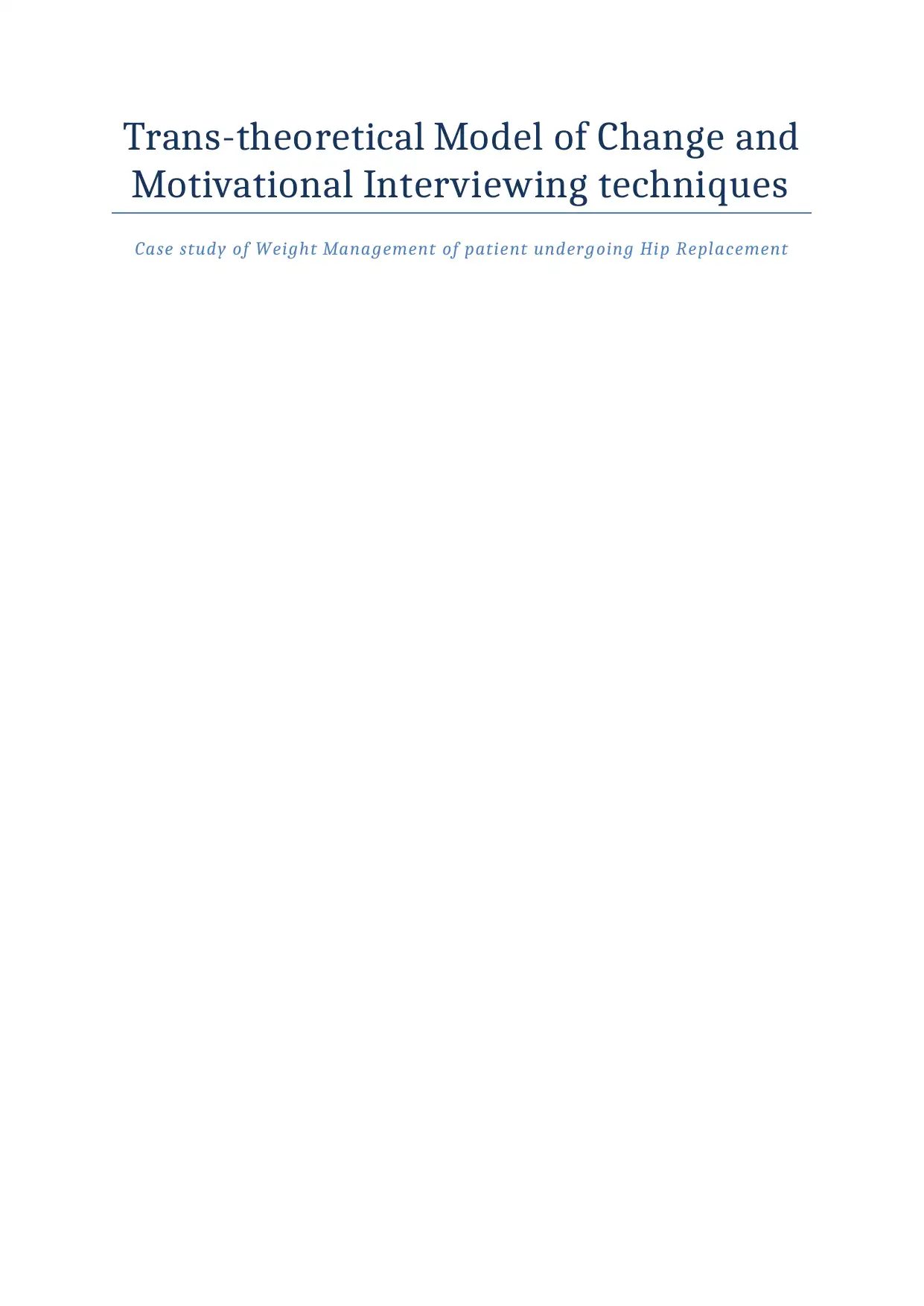
Trans-theoretical Model of Change and
Motivational Interviewing techniques
Case study of Weight Management of patient undergoing Hip Replacement
Motivational Interviewing techniques
Case study of Weight Management of patient undergoing Hip Replacement
Paraphrase This Document
Need a fresh take? Get an instant paraphrase of this document with our AI Paraphraser
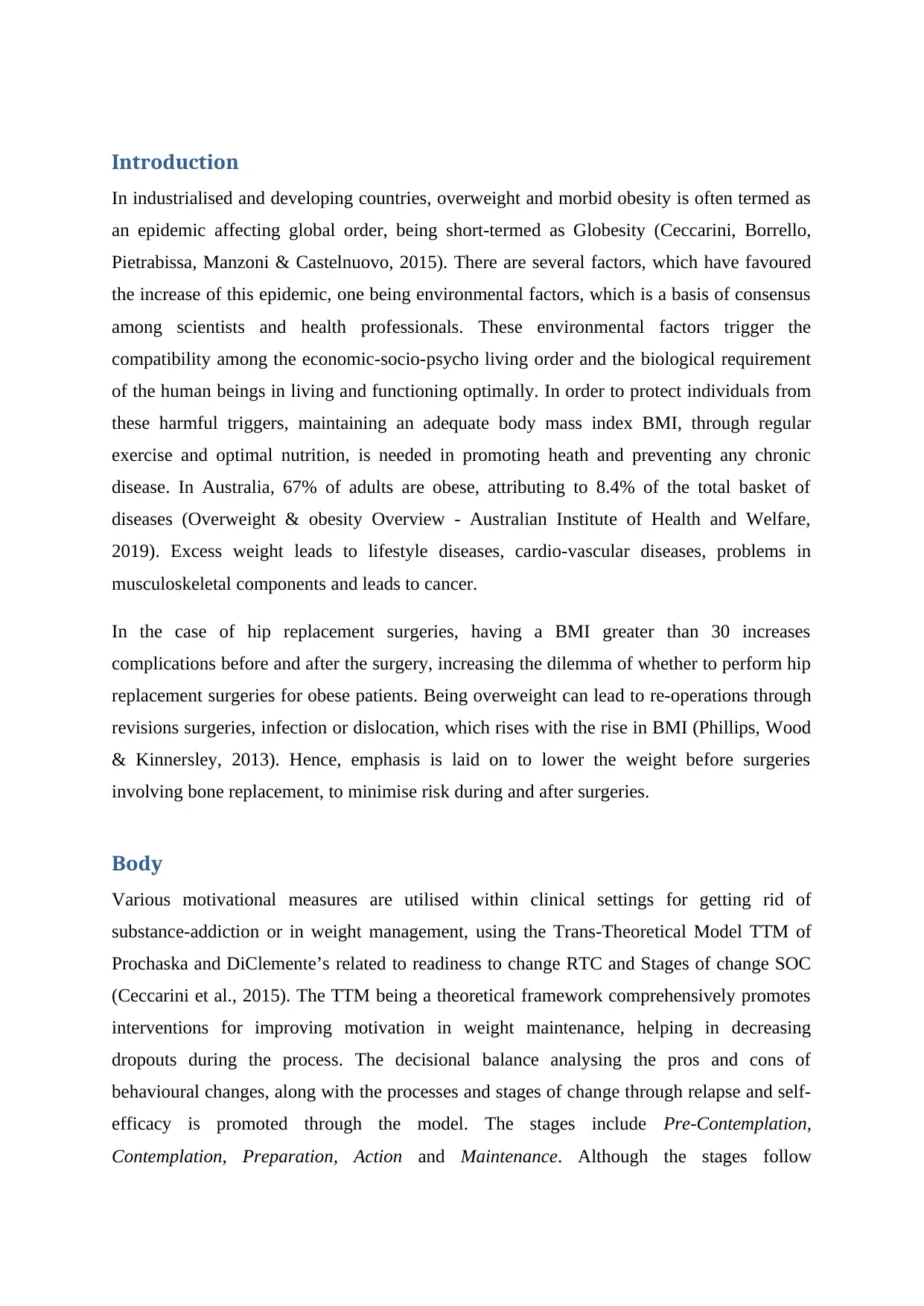
Introduction
In industrialised and developing countries, overweight and morbid obesity is often termed as
an epidemic affecting global order, being short-termed as Globesity (Ceccarini, Borrello,
Pietrabissa, Manzoni & Castelnuovo, 2015). There are several factors, which have favoured
the increase of this epidemic, one being environmental factors, which is a basis of consensus
among scientists and health professionals. These environmental factors trigger the
compatibility among the economic-socio-psycho living order and the biological requirement
of the human beings in living and functioning optimally. In order to protect individuals from
these harmful triggers, maintaining an adequate body mass index BMI, through regular
exercise and optimal nutrition, is needed in promoting heath and preventing any chronic
disease. In Australia, 67% of adults are obese, attributing to 8.4% of the total basket of
diseases (Overweight & obesity Overview - Australian Institute of Health and Welfare,
2019). Excess weight leads to lifestyle diseases, cardio-vascular diseases, problems in
musculoskeletal components and leads to cancer.
In the case of hip replacement surgeries, having a BMI greater than 30 increases
complications before and after the surgery, increasing the dilemma of whether to perform hip
replacement surgeries for obese patients. Being overweight can lead to re-operations through
revisions surgeries, infection or dislocation, which rises with the rise in BMI (Phillips, Wood
& Kinnersley, 2013). Hence, emphasis is laid on to lower the weight before surgeries
involving bone replacement, to minimise risk during and after surgeries.
Body
Various motivational measures are utilised within clinical settings for getting rid of
substance-addiction or in weight management, using the Trans-Theoretical Model TTM of
Prochaska and DiClemente’s related to readiness to change RTC and Stages of change SOC
(Ceccarini et al., 2015). The TTM being a theoretical framework comprehensively promotes
interventions for improving motivation in weight maintenance, helping in decreasing
dropouts during the process. The decisional balance analysing the pros and cons of
behavioural changes, along with the processes and stages of change through relapse and self-
efficacy is promoted through the model. The stages include Pre-Contemplation,
Contemplation, Preparation, Action and Maintenance. Although the stages follow
In industrialised and developing countries, overweight and morbid obesity is often termed as
an epidemic affecting global order, being short-termed as Globesity (Ceccarini, Borrello,
Pietrabissa, Manzoni & Castelnuovo, 2015). There are several factors, which have favoured
the increase of this epidemic, one being environmental factors, which is a basis of consensus
among scientists and health professionals. These environmental factors trigger the
compatibility among the economic-socio-psycho living order and the biological requirement
of the human beings in living and functioning optimally. In order to protect individuals from
these harmful triggers, maintaining an adequate body mass index BMI, through regular
exercise and optimal nutrition, is needed in promoting heath and preventing any chronic
disease. In Australia, 67% of adults are obese, attributing to 8.4% of the total basket of
diseases (Overweight & obesity Overview - Australian Institute of Health and Welfare,
2019). Excess weight leads to lifestyle diseases, cardio-vascular diseases, problems in
musculoskeletal components and leads to cancer.
In the case of hip replacement surgeries, having a BMI greater than 30 increases
complications before and after the surgery, increasing the dilemma of whether to perform hip
replacement surgeries for obese patients. Being overweight can lead to re-operations through
revisions surgeries, infection or dislocation, which rises with the rise in BMI (Phillips, Wood
& Kinnersley, 2013). Hence, emphasis is laid on to lower the weight before surgeries
involving bone replacement, to minimise risk during and after surgeries.
Body
Various motivational measures are utilised within clinical settings for getting rid of
substance-addiction or in weight management, using the Trans-Theoretical Model TTM of
Prochaska and DiClemente’s related to readiness to change RTC and Stages of change SOC
(Ceccarini et al., 2015). The TTM being a theoretical framework comprehensively promotes
interventions for improving motivation in weight maintenance, helping in decreasing
dropouts during the process. The decisional balance analysing the pros and cons of
behavioural changes, along with the processes and stages of change through relapse and self-
efficacy is promoted through the model. The stages include Pre-Contemplation,
Contemplation, Preparation, Action and Maintenance. Although the stages follow
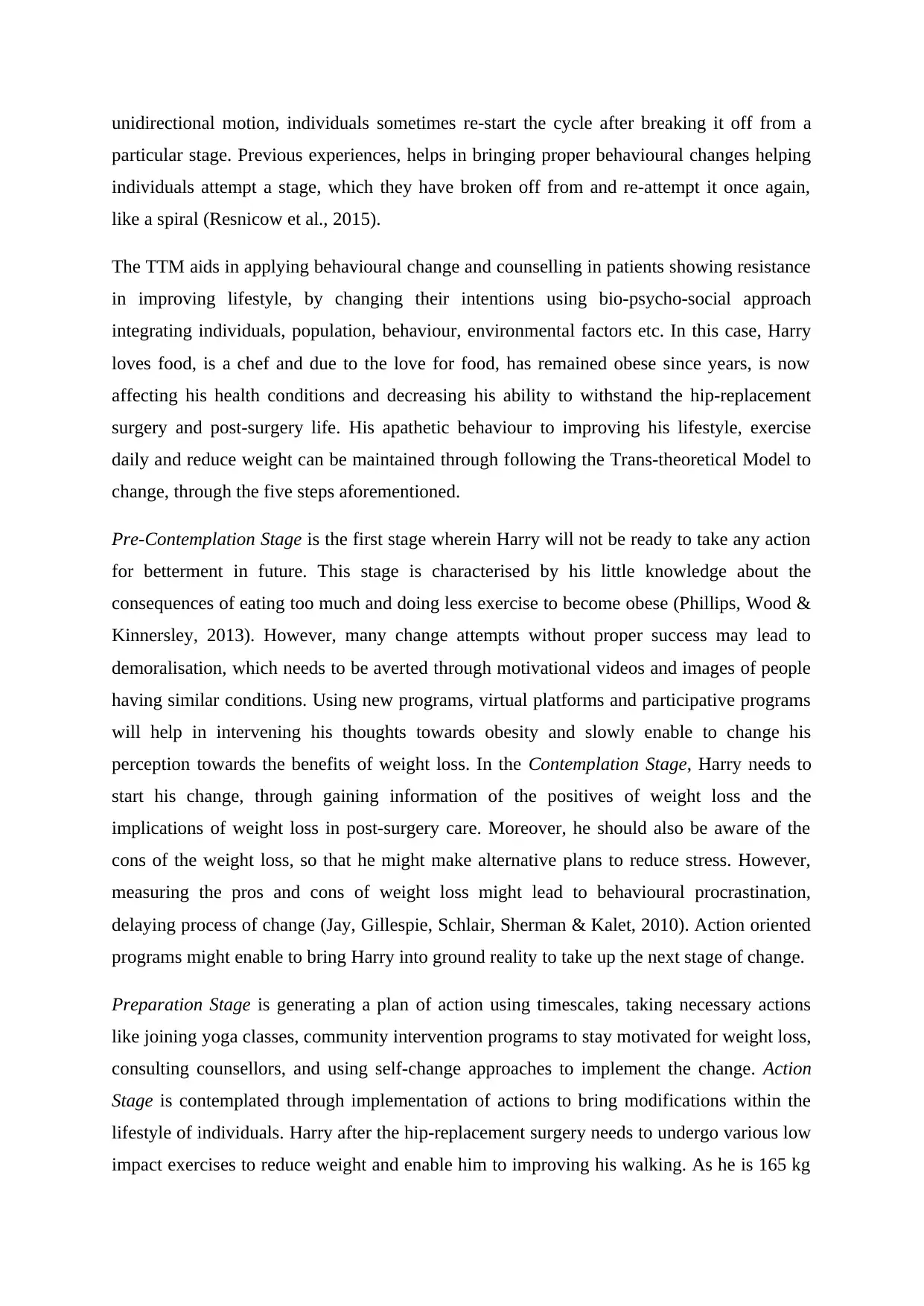
unidirectional motion, individuals sometimes re-start the cycle after breaking it off from a
particular stage. Previous experiences, helps in bringing proper behavioural changes helping
individuals attempt a stage, which they have broken off from and re-attempt it once again,
like a spiral (Resnicow et al., 2015).
The TTM aids in applying behavioural change and counselling in patients showing resistance
in improving lifestyle, by changing their intentions using bio-psycho-social approach
integrating individuals, population, behaviour, environmental factors etc. In this case, Harry
loves food, is a chef and due to the love for food, has remained obese since years, is now
affecting his health conditions and decreasing his ability to withstand the hip-replacement
surgery and post-surgery life. His apathetic behaviour to improving his lifestyle, exercise
daily and reduce weight can be maintained through following the Trans-theoretical Model to
change, through the five steps aforementioned.
Pre-Contemplation Stage is the first stage wherein Harry will not be ready to take any action
for betterment in future. This stage is characterised by his little knowledge about the
consequences of eating too much and doing less exercise to become obese (Phillips, Wood &
Kinnersley, 2013). However, many change attempts without proper success may lead to
demoralisation, which needs to be averted through motivational videos and images of people
having similar conditions. Using new programs, virtual platforms and participative programs
will help in intervening his thoughts towards obesity and slowly enable to change his
perception towards the benefits of weight loss. In the Contemplation Stage, Harry needs to
start his change, through gaining information of the positives of weight loss and the
implications of weight loss in post-surgery care. Moreover, he should also be aware of the
cons of the weight loss, so that he might make alternative plans to reduce stress. However,
measuring the pros and cons of weight loss might lead to behavioural procrastination,
delaying process of change (Jay, Gillespie, Schlair, Sherman & Kalet, 2010). Action oriented
programs might enable to bring Harry into ground reality to take up the next stage of change.
Preparation Stage is generating a plan of action using timescales, taking necessary actions
like joining yoga classes, community intervention programs to stay motivated for weight loss,
consulting counsellors, and using self-change approaches to implement the change. Action
Stage is contemplated through implementation of actions to bring modifications within the
lifestyle of individuals. Harry after the hip-replacement surgery needs to undergo various low
impact exercises to reduce weight and enable him to improving his walking. As he is 165 kg
particular stage. Previous experiences, helps in bringing proper behavioural changes helping
individuals attempt a stage, which they have broken off from and re-attempt it once again,
like a spiral (Resnicow et al., 2015).
The TTM aids in applying behavioural change and counselling in patients showing resistance
in improving lifestyle, by changing their intentions using bio-psycho-social approach
integrating individuals, population, behaviour, environmental factors etc. In this case, Harry
loves food, is a chef and due to the love for food, has remained obese since years, is now
affecting his health conditions and decreasing his ability to withstand the hip-replacement
surgery and post-surgery life. His apathetic behaviour to improving his lifestyle, exercise
daily and reduce weight can be maintained through following the Trans-theoretical Model to
change, through the five steps aforementioned.
Pre-Contemplation Stage is the first stage wherein Harry will not be ready to take any action
for betterment in future. This stage is characterised by his little knowledge about the
consequences of eating too much and doing less exercise to become obese (Phillips, Wood &
Kinnersley, 2013). However, many change attempts without proper success may lead to
demoralisation, which needs to be averted through motivational videos and images of people
having similar conditions. Using new programs, virtual platforms and participative programs
will help in intervening his thoughts towards obesity and slowly enable to change his
perception towards the benefits of weight loss. In the Contemplation Stage, Harry needs to
start his change, through gaining information of the positives of weight loss and the
implications of weight loss in post-surgery care. Moreover, he should also be aware of the
cons of the weight loss, so that he might make alternative plans to reduce stress. However,
measuring the pros and cons of weight loss might lead to behavioural procrastination,
delaying process of change (Jay, Gillespie, Schlair, Sherman & Kalet, 2010). Action oriented
programs might enable to bring Harry into ground reality to take up the next stage of change.
Preparation Stage is generating a plan of action using timescales, taking necessary actions
like joining yoga classes, community intervention programs to stay motivated for weight loss,
consulting counsellors, and using self-change approaches to implement the change. Action
Stage is contemplated through implementation of actions to bring modifications within the
lifestyle of individuals. Harry after the hip-replacement surgery needs to undergo various low
impact exercises to reduce weight and enable him to improving his walking. As he is 165 kg
⊘ This is a preview!⊘
Do you want full access?
Subscribe today to unlock all pages.

Trusted by 1+ million students worldwide
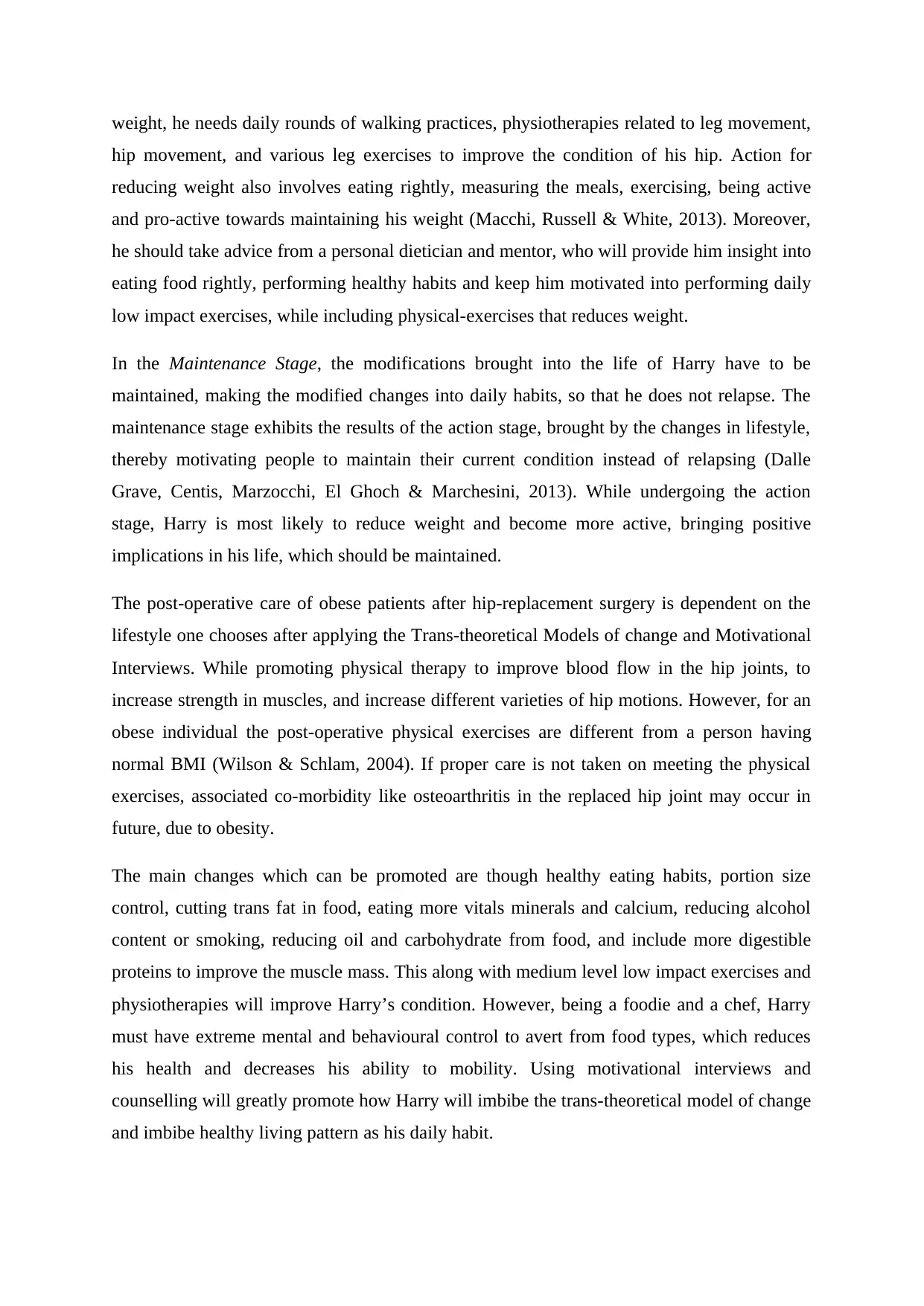
weight, he needs daily rounds of walking practices, physiotherapies related to leg movement,
hip movement, and various leg exercises to improve the condition of his hip. Action for
reducing weight also involves eating rightly, measuring the meals, exercising, being active
and pro-active towards maintaining his weight (Macchi, Russell & White, 2013). Moreover,
he should take advice from a personal dietician and mentor, who will provide him insight into
eating food rightly, performing healthy habits and keep him motivated into performing daily
low impact exercises, while including physical-exercises that reduces weight.
In the Maintenance Stage, the modifications brought into the life of Harry have to be
maintained, making the modified changes into daily habits, so that he does not relapse. The
maintenance stage exhibits the results of the action stage, brought by the changes in lifestyle,
thereby motivating people to maintain their current condition instead of relapsing (Dalle
Grave, Centis, Marzocchi, El Ghoch & Marchesini, 2013). While undergoing the action
stage, Harry is most likely to reduce weight and become more active, bringing positive
implications in his life, which should be maintained.
The post-operative care of obese patients after hip-replacement surgery is dependent on the
lifestyle one chooses after applying the Trans-theoretical Models of change and Motivational
Interviews. While promoting physical therapy to improve blood flow in the hip joints, to
increase strength in muscles, and increase different varieties of hip motions. However, for an
obese individual the post-operative physical exercises are different from a person having
normal BMI (Wilson & Schlam, 2004). If proper care is not taken on meeting the physical
exercises, associated co-morbidity like osteoarthritis in the replaced hip joint may occur in
future, due to obesity.
The main changes which can be promoted are though healthy eating habits, portion size
control, cutting trans fat in food, eating more vitals minerals and calcium, reducing alcohol
content or smoking, reducing oil and carbohydrate from food, and include more digestible
proteins to improve the muscle mass. This along with medium level low impact exercises and
physiotherapies will improve Harry’s condition. However, being a foodie and a chef, Harry
must have extreme mental and behavioural control to avert from food types, which reduces
his health and decreases his ability to mobility. Using motivational interviews and
counselling will greatly promote how Harry will imbibe the trans-theoretical model of change
and imbibe healthy living pattern as his daily habit.
hip movement, and various leg exercises to improve the condition of his hip. Action for
reducing weight also involves eating rightly, measuring the meals, exercising, being active
and pro-active towards maintaining his weight (Macchi, Russell & White, 2013). Moreover,
he should take advice from a personal dietician and mentor, who will provide him insight into
eating food rightly, performing healthy habits and keep him motivated into performing daily
low impact exercises, while including physical-exercises that reduces weight.
In the Maintenance Stage, the modifications brought into the life of Harry have to be
maintained, making the modified changes into daily habits, so that he does not relapse. The
maintenance stage exhibits the results of the action stage, brought by the changes in lifestyle,
thereby motivating people to maintain their current condition instead of relapsing (Dalle
Grave, Centis, Marzocchi, El Ghoch & Marchesini, 2013). While undergoing the action
stage, Harry is most likely to reduce weight and become more active, bringing positive
implications in his life, which should be maintained.
The post-operative care of obese patients after hip-replacement surgery is dependent on the
lifestyle one chooses after applying the Trans-theoretical Models of change and Motivational
Interviews. While promoting physical therapy to improve blood flow in the hip joints, to
increase strength in muscles, and increase different varieties of hip motions. However, for an
obese individual the post-operative physical exercises are different from a person having
normal BMI (Wilson & Schlam, 2004). If proper care is not taken on meeting the physical
exercises, associated co-morbidity like osteoarthritis in the replaced hip joint may occur in
future, due to obesity.
The main changes which can be promoted are though healthy eating habits, portion size
control, cutting trans fat in food, eating more vitals minerals and calcium, reducing alcohol
content or smoking, reducing oil and carbohydrate from food, and include more digestible
proteins to improve the muscle mass. This along with medium level low impact exercises and
physiotherapies will improve Harry’s condition. However, being a foodie and a chef, Harry
must have extreme mental and behavioural control to avert from food types, which reduces
his health and decreases his ability to mobility. Using motivational interviews and
counselling will greatly promote how Harry will imbibe the trans-theoretical model of change
and imbibe healthy living pattern as his daily habit.
Paraphrase This Document
Need a fresh take? Get an instant paraphrase of this document with our AI Paraphraser
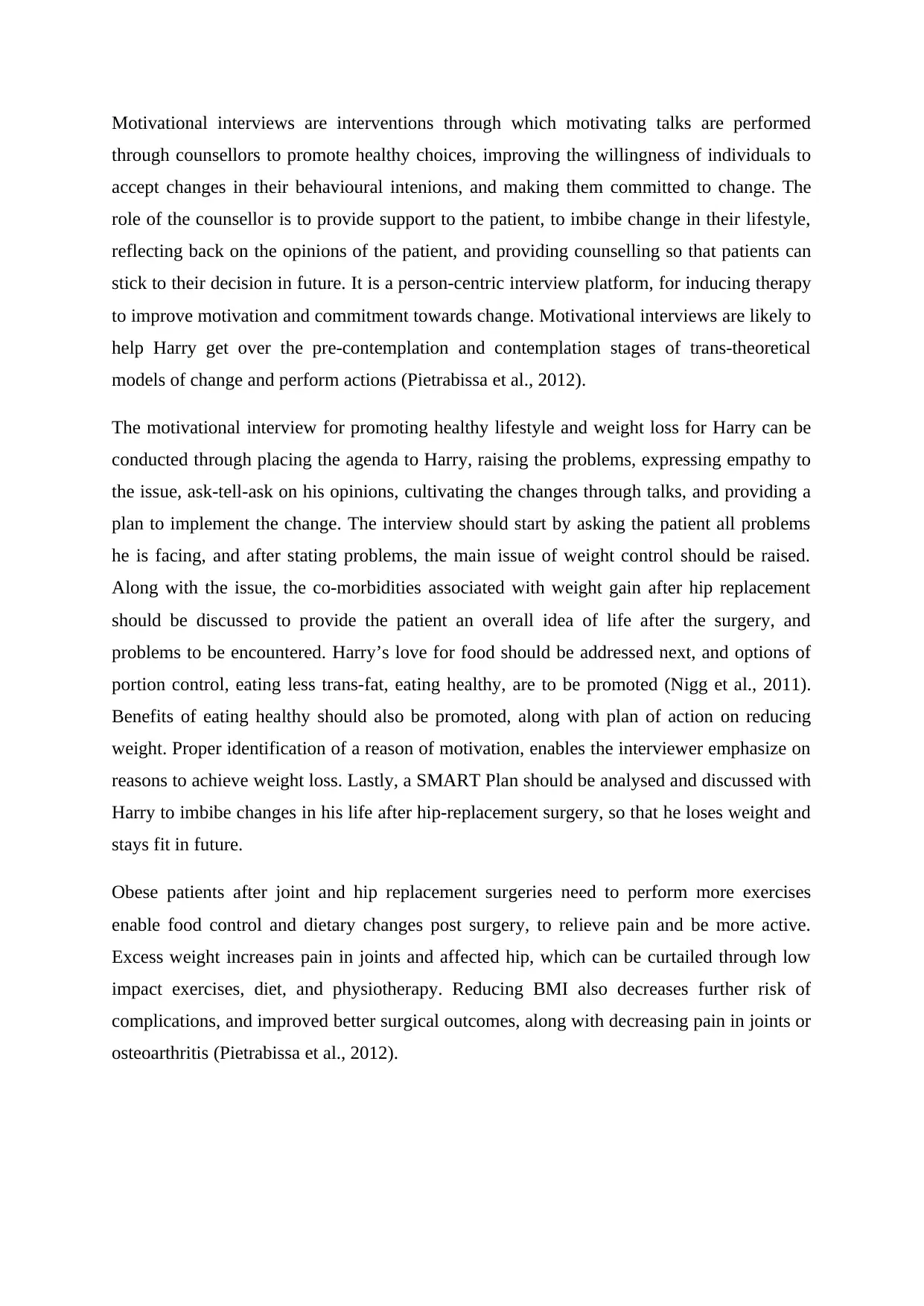
Motivational interviews are interventions through which motivating talks are performed
through counsellors to promote healthy choices, improving the willingness of individuals to
accept changes in their behavioural intenions, and making them committed to change. The
role of the counsellor is to provide support to the patient, to imbibe change in their lifestyle,
reflecting back on the opinions of the patient, and providing counselling so that patients can
stick to their decision in future. It is a person-centric interview platform, for inducing therapy
to improve motivation and commitment towards change. Motivational interviews are likely to
help Harry get over the pre-contemplation and contemplation stages of trans-theoretical
models of change and perform actions (Pietrabissa et al., 2012).
The motivational interview for promoting healthy lifestyle and weight loss for Harry can be
conducted through placing the agenda to Harry, raising the problems, expressing empathy to
the issue, ask-tell-ask on his opinions, cultivating the changes through talks, and providing a
plan to implement the change. The interview should start by asking the patient all problems
he is facing, and after stating problems, the main issue of weight control should be raised.
Along with the issue, the co-morbidities associated with weight gain after hip replacement
should be discussed to provide the patient an overall idea of life after the surgery, and
problems to be encountered. Harry’s love for food should be addressed next, and options of
portion control, eating less trans-fat, eating healthy, are to be promoted (Nigg et al., 2011).
Benefits of eating healthy should also be promoted, along with plan of action on reducing
weight. Proper identification of a reason of motivation, enables the interviewer emphasize on
reasons to achieve weight loss. Lastly, a SMART Plan should be analysed and discussed with
Harry to imbibe changes in his life after hip-replacement surgery, so that he loses weight and
stays fit in future.
Obese patients after joint and hip replacement surgeries need to perform more exercises
enable food control and dietary changes post surgery, to relieve pain and be more active.
Excess weight increases pain in joints and affected hip, which can be curtailed through low
impact exercises, diet, and physiotherapy. Reducing BMI also decreases further risk of
complications, and improved better surgical outcomes, along with decreasing pain in joints or
osteoarthritis (Pietrabissa et al., 2012).
through counsellors to promote healthy choices, improving the willingness of individuals to
accept changes in their behavioural intenions, and making them committed to change. The
role of the counsellor is to provide support to the patient, to imbibe change in their lifestyle,
reflecting back on the opinions of the patient, and providing counselling so that patients can
stick to their decision in future. It is a person-centric interview platform, for inducing therapy
to improve motivation and commitment towards change. Motivational interviews are likely to
help Harry get over the pre-contemplation and contemplation stages of trans-theoretical
models of change and perform actions (Pietrabissa et al., 2012).
The motivational interview for promoting healthy lifestyle and weight loss for Harry can be
conducted through placing the agenda to Harry, raising the problems, expressing empathy to
the issue, ask-tell-ask on his opinions, cultivating the changes through talks, and providing a
plan to implement the change. The interview should start by asking the patient all problems
he is facing, and after stating problems, the main issue of weight control should be raised.
Along with the issue, the co-morbidities associated with weight gain after hip replacement
should be discussed to provide the patient an overall idea of life after the surgery, and
problems to be encountered. Harry’s love for food should be addressed next, and options of
portion control, eating less trans-fat, eating healthy, are to be promoted (Nigg et al., 2011).
Benefits of eating healthy should also be promoted, along with plan of action on reducing
weight. Proper identification of a reason of motivation, enables the interviewer emphasize on
reasons to achieve weight loss. Lastly, a SMART Plan should be analysed and discussed with
Harry to imbibe changes in his life after hip-replacement surgery, so that he loses weight and
stays fit in future.
Obese patients after joint and hip replacement surgeries need to perform more exercises
enable food control and dietary changes post surgery, to relieve pain and be more active.
Excess weight increases pain in joints and affected hip, which can be curtailed through low
impact exercises, diet, and physiotherapy. Reducing BMI also decreases further risk of
complications, and improved better surgical outcomes, along with decreasing pain in joints or
osteoarthritis (Pietrabissa et al., 2012).
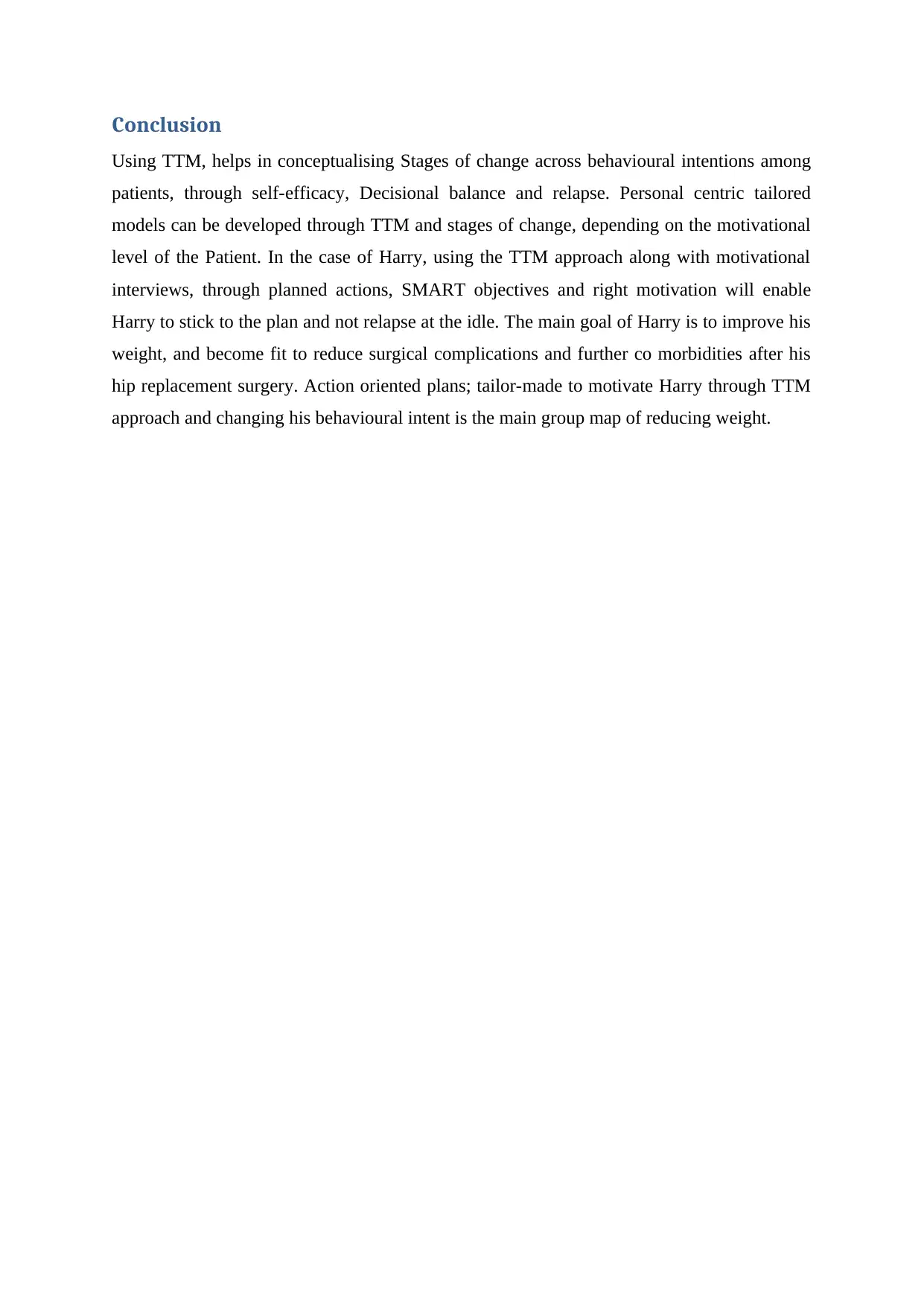
Conclusion
Using TTM, helps in conceptualising Stages of change across behavioural intentions among
patients, through self-efficacy, Decisional balance and relapse. Personal centric tailored
models can be developed through TTM and stages of change, depending on the motivational
level of the Patient. In the case of Harry, using the TTM approach along with motivational
interviews, through planned actions, SMART objectives and right motivation will enable
Harry to stick to the plan and not relapse at the idle. The main goal of Harry is to improve his
weight, and become fit to reduce surgical complications and further co morbidities after his
hip replacement surgery. Action oriented plans; tailor-made to motivate Harry through TTM
approach and changing his behavioural intent is the main group map of reducing weight.
Using TTM, helps in conceptualising Stages of change across behavioural intentions among
patients, through self-efficacy, Decisional balance and relapse. Personal centric tailored
models can be developed through TTM and stages of change, depending on the motivational
level of the Patient. In the case of Harry, using the TTM approach along with motivational
interviews, through planned actions, SMART objectives and right motivation will enable
Harry to stick to the plan and not relapse at the idle. The main goal of Harry is to improve his
weight, and become fit to reduce surgical complications and further co morbidities after his
hip replacement surgery. Action oriented plans; tailor-made to motivate Harry through TTM
approach and changing his behavioural intent is the main group map of reducing weight.
⊘ This is a preview!⊘
Do you want full access?
Subscribe today to unlock all pages.

Trusted by 1+ million students worldwide
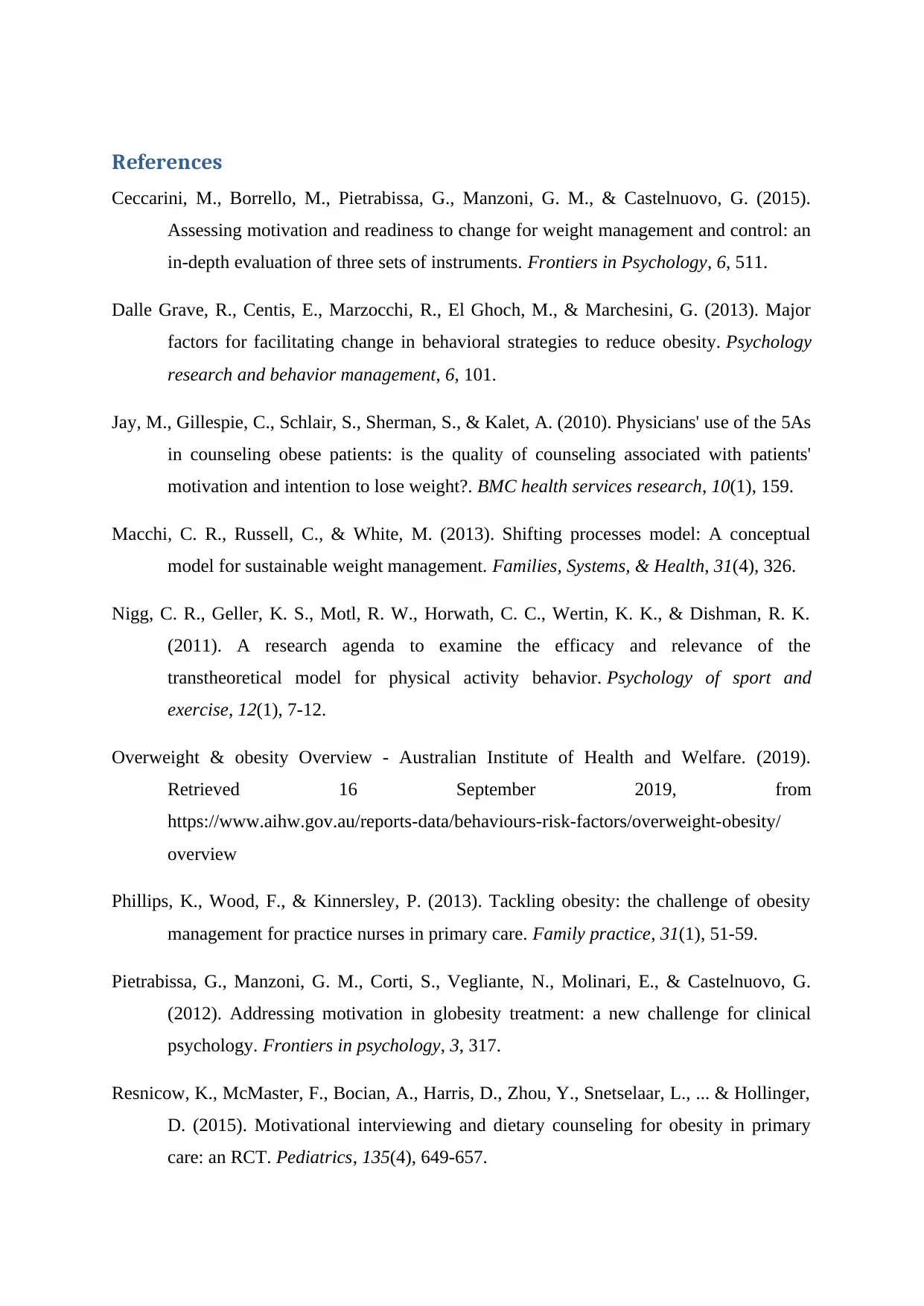
References
Ceccarini, M., Borrello, M., Pietrabissa, G., Manzoni, G. M., & Castelnuovo, G. (2015).
Assessing motivation and readiness to change for weight management and control: an
in-depth evaluation of three sets of instruments. Frontiers in Psychology, 6, 511.
Dalle Grave, R., Centis, E., Marzocchi, R., El Ghoch, M., & Marchesini, G. (2013). Major
factors for facilitating change in behavioral strategies to reduce obesity. Psychology
research and behavior management, 6, 101.
Jay, M., Gillespie, C., Schlair, S., Sherman, S., & Kalet, A. (2010). Physicians' use of the 5As
in counseling obese patients: is the quality of counseling associated with patients'
motivation and intention to lose weight?. BMC health services research, 10(1), 159.
Macchi, C. R., Russell, C., & White, M. (2013). Shifting processes model: A conceptual
model for sustainable weight management. Families, Systems, & Health, 31(4), 326.
Nigg, C. R., Geller, K. S., Motl, R. W., Horwath, C. C., Wertin, K. K., & Dishman, R. K.
(2011). A research agenda to examine the efficacy and relevance of the
transtheoretical model for physical activity behavior. Psychology of sport and
exercise, 12(1), 7-12.
Overweight & obesity Overview - Australian Institute of Health and Welfare. (2019).
Retrieved 16 September 2019, from
https://www.aihw.gov.au/reports-data/behaviours-risk-factors/overweight-obesity/
overview
Phillips, K., Wood, F., & Kinnersley, P. (2013). Tackling obesity: the challenge of obesity
management for practice nurses in primary care. Family practice, 31(1), 51-59.
Pietrabissa, G., Manzoni, G. M., Corti, S., Vegliante, N., Molinari, E., & Castelnuovo, G.
(2012). Addressing motivation in globesity treatment: a new challenge for clinical
psychology. Frontiers in psychology, 3, 317.
Resnicow, K., McMaster, F., Bocian, A., Harris, D., Zhou, Y., Snetselaar, L., ... & Hollinger,
D. (2015). Motivational interviewing and dietary counseling for obesity in primary
care: an RCT. Pediatrics, 135(4), 649-657.
Ceccarini, M., Borrello, M., Pietrabissa, G., Manzoni, G. M., & Castelnuovo, G. (2015).
Assessing motivation and readiness to change for weight management and control: an
in-depth evaluation of three sets of instruments. Frontiers in Psychology, 6, 511.
Dalle Grave, R., Centis, E., Marzocchi, R., El Ghoch, M., & Marchesini, G. (2013). Major
factors for facilitating change in behavioral strategies to reduce obesity. Psychology
research and behavior management, 6, 101.
Jay, M., Gillespie, C., Schlair, S., Sherman, S., & Kalet, A. (2010). Physicians' use of the 5As
in counseling obese patients: is the quality of counseling associated with patients'
motivation and intention to lose weight?. BMC health services research, 10(1), 159.
Macchi, C. R., Russell, C., & White, M. (2013). Shifting processes model: A conceptual
model for sustainable weight management. Families, Systems, & Health, 31(4), 326.
Nigg, C. R., Geller, K. S., Motl, R. W., Horwath, C. C., Wertin, K. K., & Dishman, R. K.
(2011). A research agenda to examine the efficacy and relevance of the
transtheoretical model for physical activity behavior. Psychology of sport and
exercise, 12(1), 7-12.
Overweight & obesity Overview - Australian Institute of Health and Welfare. (2019).
Retrieved 16 September 2019, from
https://www.aihw.gov.au/reports-data/behaviours-risk-factors/overweight-obesity/
overview
Phillips, K., Wood, F., & Kinnersley, P. (2013). Tackling obesity: the challenge of obesity
management for practice nurses in primary care. Family practice, 31(1), 51-59.
Pietrabissa, G., Manzoni, G. M., Corti, S., Vegliante, N., Molinari, E., & Castelnuovo, G.
(2012). Addressing motivation in globesity treatment: a new challenge for clinical
psychology. Frontiers in psychology, 3, 317.
Resnicow, K., McMaster, F., Bocian, A., Harris, D., Zhou, Y., Snetselaar, L., ... & Hollinger,
D. (2015). Motivational interviewing and dietary counseling for obesity in primary
care: an RCT. Pediatrics, 135(4), 649-657.
Paraphrase This Document
Need a fresh take? Get an instant paraphrase of this document with our AI Paraphraser
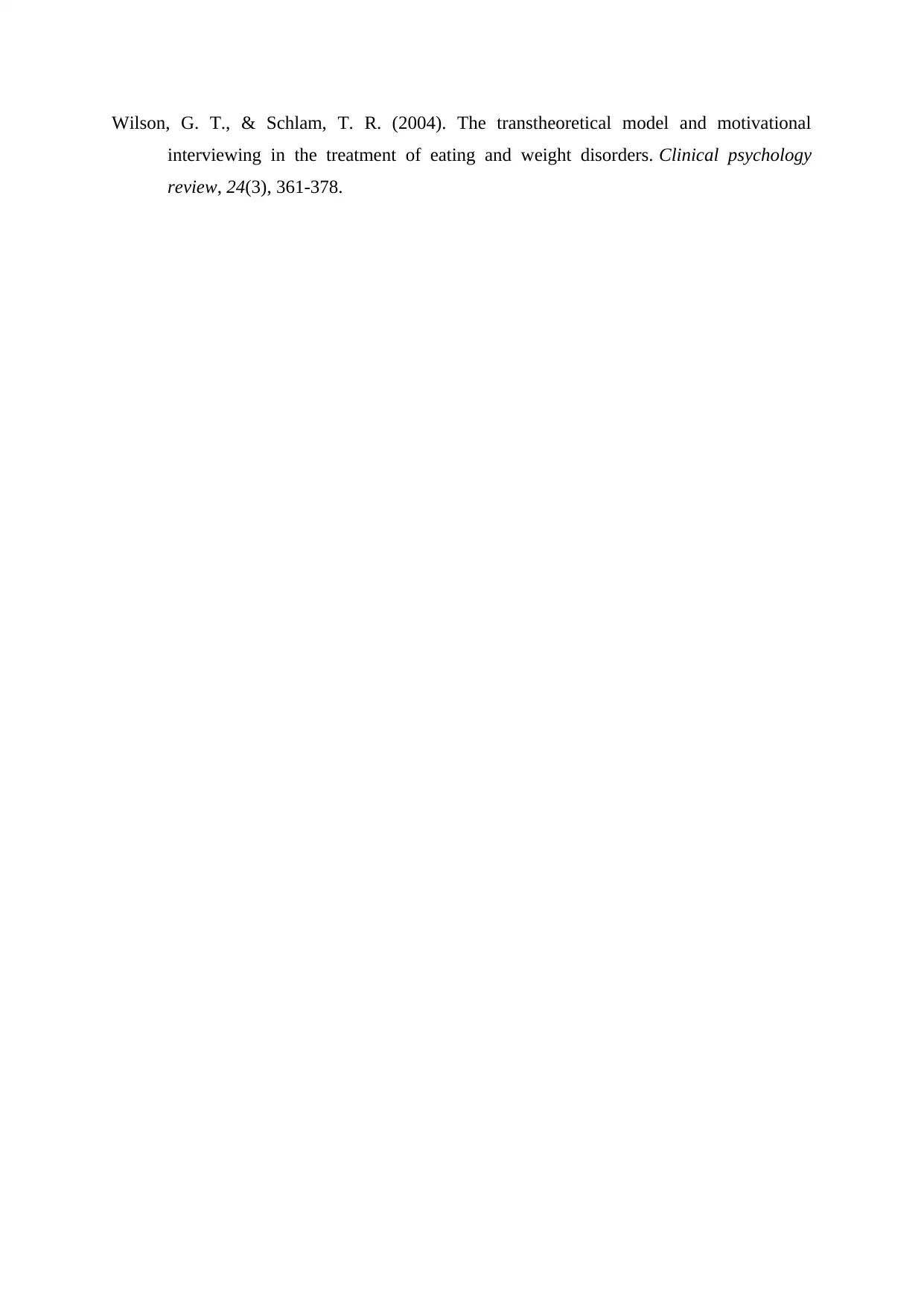
Wilson, G. T., & Schlam, T. R. (2004). The transtheoretical model and motivational
interviewing in the treatment of eating and weight disorders. Clinical psychology
review, 24(3), 361-378.
interviewing in the treatment of eating and weight disorders. Clinical psychology
review, 24(3), 361-378.
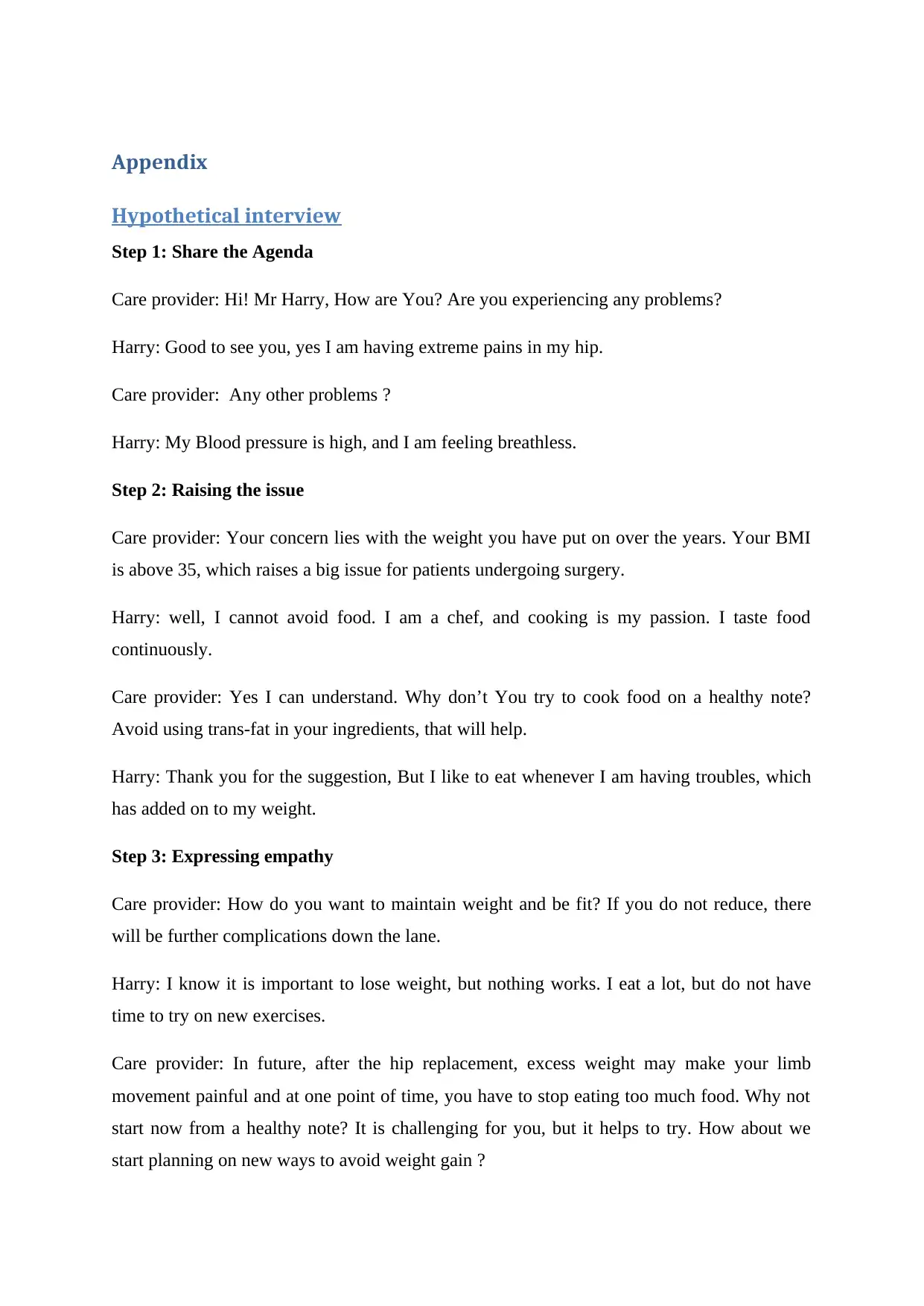
Appendix
Hypothetical interview
Step 1: Share the Agenda
Care provider: Hi! Mr Harry, How are You? Are you experiencing any problems?
Harry: Good to see you, yes I am having extreme pains in my hip.
Care provider: Any other problems ?
Harry: My Blood pressure is high, and I am feeling breathless.
Step 2: Raising the issue
Care provider: Your concern lies with the weight you have put on over the years. Your BMI
is above 35, which raises a big issue for patients undergoing surgery.
Harry: well, I cannot avoid food. I am a chef, and cooking is my passion. I taste food
continuously.
Care provider: Yes I can understand. Why don’t You try to cook food on a healthy note?
Avoid using trans-fat in your ingredients, that will help.
Harry: Thank you for the suggestion, But I like to eat whenever I am having troubles, which
has added on to my weight.
Step 3: Expressing empathy
Care provider: How do you want to maintain weight and be fit? If you do not reduce, there
will be further complications down the lane.
Harry: I know it is important to lose weight, but nothing works. I eat a lot, but do not have
time to try on new exercises.
Care provider: In future, after the hip replacement, excess weight may make your limb
movement painful and at one point of time, you have to stop eating too much food. Why not
start now from a healthy note? It is challenging for you, but it helps to try. How about we
start planning on new ways to avoid weight gain ?
Hypothetical interview
Step 1: Share the Agenda
Care provider: Hi! Mr Harry, How are You? Are you experiencing any problems?
Harry: Good to see you, yes I am having extreme pains in my hip.
Care provider: Any other problems ?
Harry: My Blood pressure is high, and I am feeling breathless.
Step 2: Raising the issue
Care provider: Your concern lies with the weight you have put on over the years. Your BMI
is above 35, which raises a big issue for patients undergoing surgery.
Harry: well, I cannot avoid food. I am a chef, and cooking is my passion. I taste food
continuously.
Care provider: Yes I can understand. Why don’t You try to cook food on a healthy note?
Avoid using trans-fat in your ingredients, that will help.
Harry: Thank you for the suggestion, But I like to eat whenever I am having troubles, which
has added on to my weight.
Step 3: Expressing empathy
Care provider: How do you want to maintain weight and be fit? If you do not reduce, there
will be further complications down the lane.
Harry: I know it is important to lose weight, but nothing works. I eat a lot, but do not have
time to try on new exercises.
Care provider: In future, after the hip replacement, excess weight may make your limb
movement painful and at one point of time, you have to stop eating too much food. Why not
start now from a healthy note? It is challenging for you, but it helps to try. How about we
start planning on new ways to avoid weight gain ?
⊘ This is a preview!⊘
Do you want full access?
Subscribe today to unlock all pages.

Trusted by 1+ million students worldwide
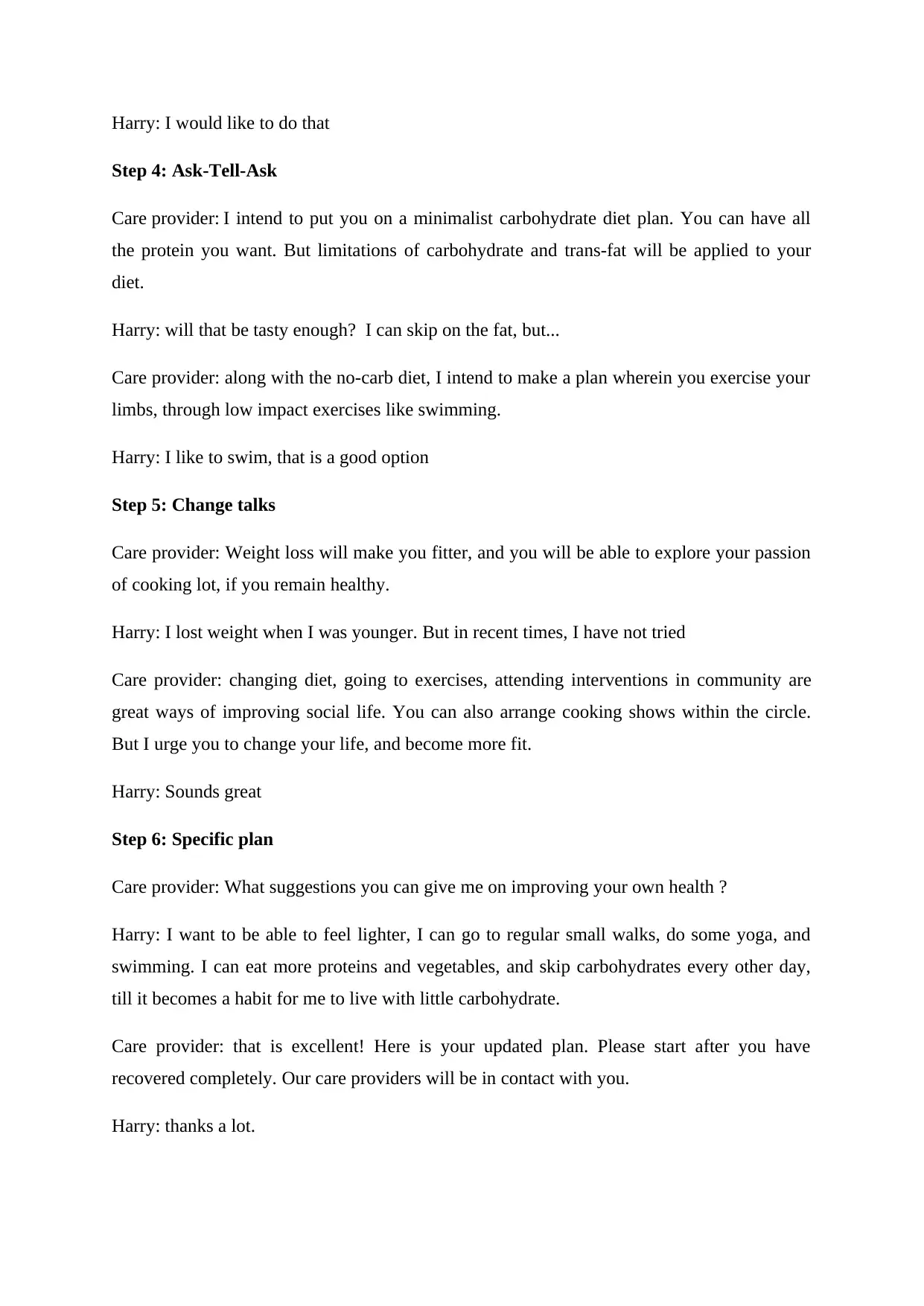
Harry: I would like to do that
Step 4: Ask-Tell-Ask
Care provider: I intend to put you on a minimalist carbohydrate diet plan. You can have all
the protein you want. But limitations of carbohydrate and trans-fat will be applied to your
diet.
Harry: will that be tasty enough? I can skip on the fat, but...
Care provider: along with the no-carb diet, I intend to make a plan wherein you exercise your
limbs, through low impact exercises like swimming.
Harry: I like to swim, that is a good option
Step 5: Change talks
Care provider: Weight loss will make you fitter, and you will be able to explore your passion
of cooking lot, if you remain healthy.
Harry: I lost weight when I was younger. But in recent times, I have not tried
Care provider: changing diet, going to exercises, attending interventions in community are
great ways of improving social life. You can also arrange cooking shows within the circle.
But I urge you to change your life, and become more fit.
Harry: Sounds great
Step 6: Specific plan
Care provider: What suggestions you can give me on improving your own health ?
Harry: I want to be able to feel lighter, I can go to regular small walks, do some yoga, and
swimming. I can eat more proteins and vegetables, and skip carbohydrates every other day,
till it becomes a habit for me to live with little carbohydrate.
Care provider: that is excellent! Here is your updated plan. Please start after you have
recovered completely. Our care providers will be in contact with you.
Harry: thanks a lot.
Step 4: Ask-Tell-Ask
Care provider: I intend to put you on a minimalist carbohydrate diet plan. You can have all
the protein you want. But limitations of carbohydrate and trans-fat will be applied to your
diet.
Harry: will that be tasty enough? I can skip on the fat, but...
Care provider: along with the no-carb diet, I intend to make a plan wherein you exercise your
limbs, through low impact exercises like swimming.
Harry: I like to swim, that is a good option
Step 5: Change talks
Care provider: Weight loss will make you fitter, and you will be able to explore your passion
of cooking lot, if you remain healthy.
Harry: I lost weight when I was younger. But in recent times, I have not tried
Care provider: changing diet, going to exercises, attending interventions in community are
great ways of improving social life. You can also arrange cooking shows within the circle.
But I urge you to change your life, and become more fit.
Harry: Sounds great
Step 6: Specific plan
Care provider: What suggestions you can give me on improving your own health ?
Harry: I want to be able to feel lighter, I can go to regular small walks, do some yoga, and
swimming. I can eat more proteins and vegetables, and skip carbohydrates every other day,
till it becomes a habit for me to live with little carbohydrate.
Care provider: that is excellent! Here is your updated plan. Please start after you have
recovered completely. Our care providers will be in contact with you.
Harry: thanks a lot.
1 out of 10
Related Documents
Your All-in-One AI-Powered Toolkit for Academic Success.
+13062052269
info@desklib.com
Available 24*7 on WhatsApp / Email
![[object Object]](/_next/static/media/star-bottom.7253800d.svg)
Unlock your academic potential
Copyright © 2020–2026 A2Z Services. All Rights Reserved. Developed and managed by ZUCOL.





